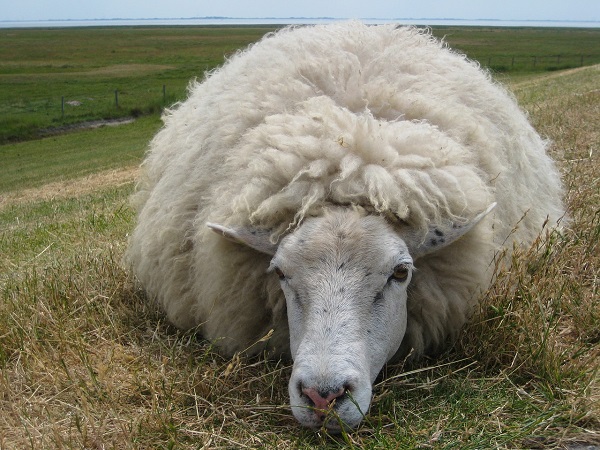

A large part of raising wool animals is knowing what to feed sheep in order to obtain good quality wool. Feeding choices will vary from place to place. The sheep farmers who have large acreage will raise sheep differently than the small property owner. Knowing what to feed sheep is going to be slightly different. Sheep and other wool and fiber producing animals are herbivores. They receive nutrients by eating plants. All animals require nutrients including protein, carbohydrate, fats, water, vitamins and minerals. Sheep will be getting these nutrients largely from eating plants, primarily grass pasture or hay. The nutrients provide energy, support growth and optimize body functions. A wool-producing sheep is not only maintaining her body, but also growing wool fleece. The growth of the wool doesn’t take a large increase in nutrients but the quality of the nutrients does make a difference in the quality of the wool.
Pasture
Pasture should be the main source of nutrition for sheep. If pasture is not available, a good quality hay can be just as good. Hay quality is variable and very weather dependent. Pasture that has been cut too late, or too early will greatly vary the nutrients available. Try to maintain as even a nutrition level as possible since sudden changes in diet can lead to severe problems in ruminants. Any sudden changes in diet can cause life-threatening complications in the rumen, or sheep bloat. Make any diet changes gradually to avoid problems.
Grain.
Adding grain to the sheep’s diet is a good way to increase nutritional value. This practice can be very beneficial during times of poor pasture quality. Some farmers will add grain to the sheep’s feed during winter when the primary nutrient source is hay. Use whole grains rather than processed or crushed. Crushed or ground grains can be dusty. Whole grains still have the vitamins and oils intact. While whole grains can be a good way to provide healthy nutrients, a diet of only grain will cause rumen inflammation. When pasture is not available, hay should be the main part of a healthy diet for sheep.
Water
Probably the most important nutrient is water. Animals simply cannot live without water for more than a day or two. Water keeps all the organs in the body functioning and hydrated. And it transports waste out of the body in the urine and feces. Without water the temperature regulating mechanisms would shut down and nutrients would not be able to be used by the body. Providing clean water is essential to the daily tasks when feeding sheep and other wool producing animals. The weather has a large impact on how much water the animals will consume. It is important to monitor this and keep the water source full of fresh water. If you have nursing ewes, they will require more water as they produce milk.
 Contact Jaguza Support
Contact Jaguza Support